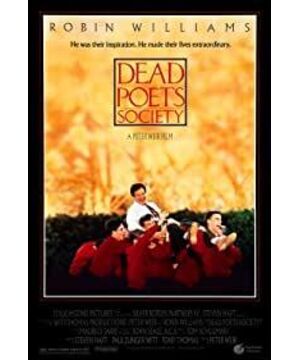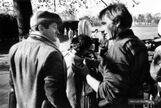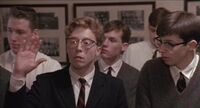The question about whether it is the traditional light of knowledge or the ideal wing of freedom is first expressed in the entrance ceremony at the beginning of the film, on the four banners that are raised high: tradition, honor, discipline, and excellence. Famous Hungarian film The theorist Balaz Bella (1884-1949), wrote a book "The Visible Man--The Spirit of Film". He tried to use Marxist perspective to systematically explain the aesthetics of film. He said: There is no good film at all. "Content", what an excellent movie has should be "taste", just like a painting, a piece of music, or just as a facial expression does not have so much content.
Of course, unique cultural expression is an integral part of it, but I always think that it is just a form and bridge of taste expression. Movie is the art of appearance, "what you say is what you think in your heart". It is still the art of instant display of the description of action and organic continuity, which is to combine it with The basic point of the difference between painting. Atmosphere is the soul of all art. Atmosphere is the air that sustains life, just as various forms float around the key parts of the work with their own unique sublimation, creating a certain tone of a special world. Artistic atmosphere is like It is concentrated in some images like a mysterious original substance wrapped in mist. If the artist successfully creates an atmosphere, then even if some details are inferior, it will not affect the whole work much. If we want to know, this unique Where the atmosphere comes from, we have found the most hidden and deepest source of all art. In this film, we can feel and experience this atmosphere at all times instead of "seeing" it, for example, school traditions The concept's suppression of the interpretation and pursuit of human freedom, from the opening ceremony at the beginning, to each subsequent class, to various gatherings,
Many of the American films we generally watch are plain, vulgar and monotonous, and the actors' performances are not noticeable (but the charm of the performance and facial expressions makes up for the shortcomings), but we still I can see from the beginning to the end with great interest, I think, this is the credit of the atmosphere. The
boys in the dormitory unanimously ridiculed the four concepts as: imitation, horror, decadence, and filth. There are many seconders. In theirs In their hearts, they should be well aware of the harshness and rigidity of this hell school. But they understand more that it is not only from the tradition of the school, but also caused by the discipline of the parents and the family and the mainstream concept of the society. Suffering to the disappearance of character, spirituality and enthusiasm. The calmness of decades was broken by a new English teacher named Keating. From the first class, he showed his uniqueness and enthusiasm. The spirit of romanticism. From all aspects, subtly persuading students to "seize the day" in time to have fun, do what they think is the most meaningful thing and abandon the traditional barriers. Shakespeare once said: Youth is a constant jumping The rabbit crossing the fence. Exactly. The
scene where Keating teacher asked students to practice walking in the atrium to find their own unique gait is impressive. He cited Robert Frost’s famous poem. : There are two fork roads in the woods. I chose the one that few people have walked. There is a world of difference. The person who learns poetry seems to always be the incarnation of the emotional god. What he is teaching is not a poem, no The life of a poet is a breakthrough spirit that goes upstream.
Movies and Psychoanalysis
Victor Hugo wrote in his book: Printed matter replaced the role of medieval churches and became the disseminators of people's thoughts. Now another kind of machine is showing the primacy of visual expression more prominently, that is, film. Its impact on the human world is no less than printing. As early as May 1975, the French comprehensive theoretical publication "Communication" The 23rd issue published a series of articles on the theme of "Film Psychoanalysis", marking the beginning of the combination of film structuralist semiotics and psychoanalysis. Analyzing this film in the category of film psychoanalysis involving the four main aspects of Freud's psychoanalysis theory is what I want to express here.
1 The essence of personality. Human mental activities include three levels: the id (or translated "Yide", that is, the unconscious instinct), the ego (that is, the conscious personality), and the superego (that is, conscience). The relationship between these three is: the internal drive caused by instinctive impulse is suppressed and "censored" by the self and superego, so it manifests as a dream or psychosis in the form of "transfer". 2 Unconscious realm. Most of the spiritual activities of human beings are unconscious, and only unconscious activities are real spiritual activities. 3 The operation of dreams. 4 Sexuality theory. The main energy of spiritual activity is "sexual vitality" or "libido", and the driving force of human social activities and artistic creation is the sexual desire that expresses sexual vitality.
Poets do not lie because they do not claim to disclose the truth. The melody moves us, but it does not give us wrong information. Myths are rarely astray like dreams. Therefore, we can refer to poets and romantics. The idealist sees it as a manifestation of the id, an unconscious impulse belonging to human nature itself. Here, everything that transcends the mundane, such as Keating, is a model of this kind. Just like his one in the film Saw the words say: Poetry can be inspired by anything, but don’t let your poems be ordinary. The poet himself is the most extraordinary spiritual form. In addition, there is Charlie Dutton, who calls himself Nuanda, from the first one. The book writer, from the pursuit of the right not to walk, to the publication by the Yigu Poet Society, who let girls enter Wilton College and "received a call from God" at the assembly, is such an out-and-out liberalism. Practitioner of, Nacks, who actively pursued love, and Neil, who actively pursued drama and acting careers under the resistance of his parents, eventually died by suicide. Of course, the one who uttered the phrase "We are crying under the guidance of Keating Entering this life, until we are dying and leaving this world, it can only cover your face, allowing you to sorrow, cry or scream "Anderson." All of them belong to this category.
Students of Wilton College, regardless of It is the children who walked into this school full of rigid dogma under the gaze of their parents' force or expectation. They have a sense of self, otherwise they would not ridicule the four concepts as: imitation, terror, decadence and filth. But. They are unable to go out of their own way under the imprint of tradition, or even though they have self-consciousness and personality, they are obliterated and perished under a strong pressure. This is the so-called self.
Among the students are Cameroon, who has not been moved by the spring weather, as well as the principal teachers and parents of Wilton College, who can belong to the superego. They play the role of censor and repressor, a symbol of tradition. They are also the most deeply socialized type of people. They will not be influenced by talent or poetry, let alone the so-called enthusiasm. They are calm, or cold-blooded, lack passion and fantasy, and they are just "cynics." The best interpretation of "ism" or "realist".
Parallel narratives and deeper truths
. Two or more plots in this movie are interlaced and paralleled, but the characters and characters have not changed. Various feelings that appear repeatedly The similarity and the parallelism of various destinies seem to prove the regularity and universality of events and their deeper and more mysterious meaning. Some people say that working hard to create a film that reflects the world view is by no means hopeless. In movies It is unimaginable to express "deep things" and "hidden" in the influence of two-dimensional space. Therefore, the film tries to use parallel narratives to describe the fusion of themes and materials in the literature, so that the human body can understand the profoundness. And duality. The film cannot use witty dialogue to reveal the hidden truth, but can only interweave the clues of the fate of various characters to show it. First of all, the characters in the film are intertwined and complex, some pursue freedom, some are rigid and stubborn, and some Full of enthusiasm, some are cowardly and timid. Using this as the main line, interspersed and intersected in various events and stories, focusing on showing their different but distinct characters and personalities. Secondly, the character's personality is at the beginning and development of the story. There are changes in the process. For example, Anderson in this film is a fairly obvious example. When he participated in the ancient poets club, he was cowardly and unwilling to join formally, but even though he was only interested in it, it was also inspiring. He entered the ranks of auditing and recording. The poems completed in class with the help of Keating are a major turning point in his character and outlook on life and values. Driven by enthusiasm and free spirit, he is full of those in his heart. Feelings and rich fantasies have emerged, showing his talents, and let us see a talent that is suppressed under the traditional education system. It is so sad. The final result, we look at it with joy. When it came to the subtle influence of free will on him, in the classroom where Keating was about to leave, he was the first to stand bravely on the classroom table and read the phrase "oh, captain," affectionately.my captain!".
The scene is switched among the scenes of students bravely standing on the table after hesitating, and Keating's gratification and excitement are among them. The length of the scene is changed according to the plot requirements. The emotional length of the scene is also called "lyrical length". ". Refers to an effective length of the lens in the film. Not narrative, but the inner emotion of the character or the emotional atmosphere expressed by the scene to determine the length of the shot. The internal emotions and external actions of the characters in the film are sometimes not exactly the same. Therefore, at the emotional climax or at the end of the paragraph, the size of the shot can often not be dealt with according to the length of the narration, but needs to be extended appropriately to express the unfinished. mood. Since the emotional length is aimed at highlighting the ups and downs of the plot or the passion of the characters and deepening the impression of a certain artistic conception on the audience, it is often used for close-up shots or empty shots with simple content. In this film, the use of this technique is not uncommon. In my opinion,
the light of freedom of film art
, the story reflected in the film and the spirit of the film itself are an invisible fit. Kurosawa said: "I I think the so-called movie is like a huge square where people from all over the world gather to socialize, talk, and watch the movie together to experience the life experiences of all kinds of people in the world of the screen, sharing joy and sorrow with them, and feeling it together. Pain and anger. Therefore, to say that movies can enable people in the world to communicate cordially is also based on this characteristic of movies...Those individuals who form a group, once they are formed into a group, they are different from individual people, they There will be a kind of collective consciousness". In other art appreciation activities, the viewer can maintain a distance from the creator and the same work, while the audiovisual impact of the film, the narrative rhythm of the montage, and the specific viewing environment (dark room) make the audience in a relatively The passive acceptance position, under the guidance of the narrator, usually merges with the narrator’s point of view. "The art of film starts here. The neurotic hand that madly grasps the deadly weapon can suddenly Enlargement becomes the only thing that can be seen on the screen, and everything else really disappears in the darkness. The act of attention in our minds transforms the environment itself." (Yuguo Minsterberg)
In fact, this type of communication is a cooperative game on special occasions. Film and television dramas are the object of "being watched", the audience is the subject of "watching", and the point of "transaction" should be the "uncertainty point". In the eyes of a reader, there should be a thousand Hamlet, and in the eyes of a thousand audiences, there should be different angles of appreciation and appreciation. This is the artistic freedom that movies need to express, and like poetry, it is the unruly pursuit of human beings. The light of art.
View more about Dead Poets Society reviews






